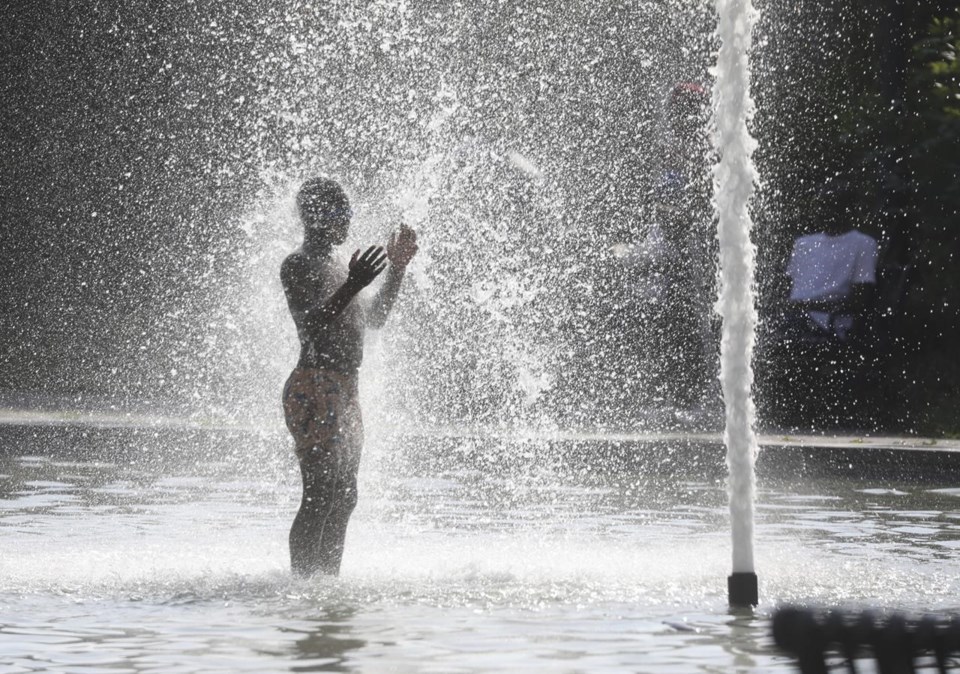Police said at least eight dogs being transported inside an uncooled cargo van in Indiana died of heat-related injuries this week as temperatures soared amid an intense heat wave gripping much of the United States. The heat was not letting up Saturday in many areas, including in New York City, where temperatures were expected to surge into the lower 90s (around 35 C). Officials say the humid, thick air could make it feel well over the century mark for many Americans.
The sizzling air has heated up everything from the ocean to pools, making it difficult to cool off. One woman in the Southwest has been throwing blocks of ice in her pool.
Metro Phoenix hit its 30th consecutive day of record-breaking heat on Saturday. Scientists calculate this month will be the hottest globally on record and likely the warmest human civilization has seen.
Here’s what’s happening related to extreme weather and the climate right now:
— Police said the eight dogs that died were among 18 Shepherds being transported from O’Hare International Airport in Chicago to a K-9 training facility in Michigan City, Indiana. The driver told police he was unaware that the air conditioning unit was not cooling the back of the van until he heard dogs barking. He pulled over in Lake Station, Indiana, to open the back. Lake Station police said he then found several dogs dead and others suffering.
— Heat advisories continued in New York City, where high humidity has made it uncomfortable and dangerous. Some 500 cooling centers have opened across the city’s five boroughs, and the governor authorized the state’s swimming pools to stay open later. The extreme heat was forecast to ease Sunday.
— Parts of Massachusetts, Rhode Island and Connecticut were under a heat advisory through Saturday night. In northern New England, temperatures were down 10 to 20 degrees Fahrenheit after getting into the 90s (around 35 degrees Celsius) on Friday, but the humidity lingered throughout the region.
— The weather was equally stifling and muggy in the center of the United States. An excessive heat warning was issued for much of Missouri, Kansas and western Illinois, where the sweaty mix of heat and humidity could make it feel like up to 112 degrees Fahrenheit (44.4 degrees Celsius) in some areas. St. Louis health director Dr. Mati Hlatshwayo Davis said the risk of heat stroke was high and warned that interior car temperatures could reach lethal levels in minutes.
— Similar warnings were issued for much of the Deep South, which encompasses Georgia, Arkansas, Alabama, Louisiana and Mississippi, with temperatures in the 90s (around 35 Celsius) and heat indexes past 100 (43.3 Celsius).
— The extreme heat has refocused attention on the lack of air conditioning in prisons. The Prison Policy Initiative, a national think tank, included Missouri and Kansas in a 2019 list of 13 “famously hot states” that lack universal air conditioning in prisons. In Missouri, only half of the prisons are fully air conditioned. And in Kansas, adding air conditioning to the newest prison sparked outrage among some lawmakers who saw it as coddling inmates.
— Phoenix broke another heat record Saturday, marking the 30th consecutive day of temperatures reaching or surpassing 110 degrees Fahrenheit (43.3 Celsius). With the arrival of monsoon rains, temperatures are forecast to start to drop in the hottest areas in the U.S. Southwest, especially Phoenix. Temperatures are also expected to ease in Las Vegas, Albuquerque and Death Valley, California.
— With the scorching heat, even going for a swim offered little to no relief. Sea surface temperatures rose above 100 degrees Fahrenheit (37.8 Celsius) at a spot off Florida’s southern tip, while swimming pools in the Southwest gave the sensation of being in soup.
— The high temperatures are reaching across the globe, including in Bolivia, where a drought alert has been declared for Lake Titicaca after water levels of the world’s highest navigable lake receded to a critically low threshold.
___
Associated Press writers Bobby Caina Calvan in New York; Heather Hollingsworth in Mission, Kansas; Ken Ritter in Las Vegas; Chevel Johnson in New Orleans; John O'Connor in Springfield, Illinois; and Kathy McCormack in Concord, New Hampshire, contributed to this report.
___
Associated Press climate and environmental coverage receives support from several private foundations. See more about AP’s climate initiative here. The AP is solely responsible for all content.
)
The Associated Press



